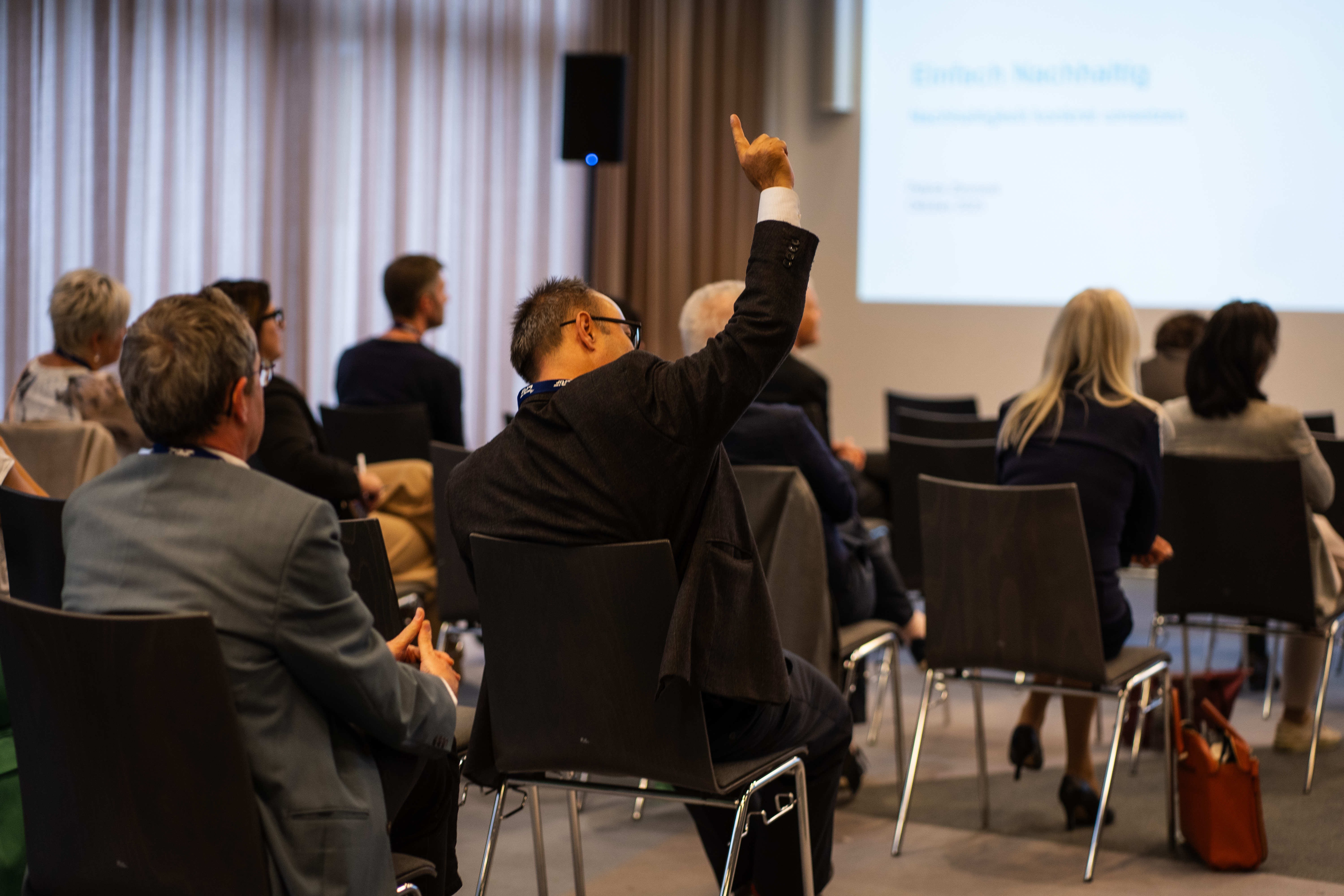
In addition to delicious snacks, delicious drinks and engaged participants, there were fascinating presentations on the topic of ESG. The outstanding speakers were Luca Bonaccorsi, Dr Astrid Offenhammer, Richard Gaechter, Gabriel Marosi and Patrick Zimmerli. Stefanie Egger, head of CRIF ESG Consulting, chaired this enlightening afternoon.
The opening speech was given by Manuel Zollikofer, CEO of CRIF, and was marked by a few words and facts about CRIF. The strong and new world
Luca Bonaccorsi of PCW, a long-time consultant to EFRAG, has been a great help to CRIF in developing the new SME questionnaire for the Synesgy platform and aligning it with the European Sustainability Reporting Standards. In his engaging presentation, he emphasised the critical importance and far-reaching impact of ESG KPIs. Using a simple example, Luca Bonaccorsi illustrated that ESG regulation works in a similar way to nature, where larger companies set the standards for smaller ones, even if the latter are not directly affected.
While new ESG regulations are an important driver of corporate change, intrinsic motivation plays a much larger role. Bonaccorsi noted that addressing this motivation for ESG within a company is much more effective. In addition to long-term sustainability, it encourages innovation within the organisation and fosters closer relationships with stakeholders. Intrinsic motivation also leads to proactive actions and better responses to emerging risks or issues.
In addition to highlighting the three compelling reasons to improve a company's ESG score, he presented a comprehensive set of 18 different strategies to improve a company's ESG profile, all of which can be implemented at no additional cost and were highly appreciated by the participants.
ESG regulation - today and tomorrow
The second speaker at the event was Dr Astrid Offenhammer from PwC. As a lawyer and business expert, she has in-depth knowledge of aligning a company's requirements and processes with external regulatory requirements. Switzerland is witnessing the introduction of complex legislation with short implementation deadlines. One of these is transparent sustainability reporting, which includes specific data and performance indicators.
In her presentation, Dr Offenhammer outlined the essential steps companies need to take to produce a comprehensive sustainability report. Her insights shed light on the critical factors to consider as a company embarks on this task. At the end of her engaging presentation, Dr Offenhammer outlined concrete steps to help attendees confidently navigate through environmental, social and governance issues and embark on a successful ESG journey.
Supply chain challenges
Navigating the complexities of Scope 1, 2 and 3 regulations is no easy task. To present as a sustainable company, suppliers are required to run a sustainable and ESG-friendly business. But how can companies effectively manage the complexities of their supply chain? Richard Gaechter, Head of Consulting Switzerland at CRIF, offered a compelling solution.
To effectively manage a company's supply chain, an ESG score is helpful as a first step. Then, using a dedicated platform such as Synesgy, suppliers can enter their data, answer specific questions and receive a certificate with a corresponding score. To be truly sustainable, a company must not only know its own score, but also gather comprehensive information about its supply chain. Richard Gaechter demonstrated how this can be achieved with just three simple steps, supported by CRIF Synesgy, leading to an efficient process.
After a short coffee break and the opportunity to network with other attendees and speakers, the event continued.
Building a business with ESG
Erste Group, with numerous subsidiaries across Europe, has successfully integrated the stringent sustainability regulations of the European Union. Its approach goes beyond mere compliance and includes the active implementation of a sustainable corporate vision with a clear focus on ESG principles. In this context, it was not surprising that Gabriel Marosi discussed the concept of "sustainability is not charity" during the event.
Marosi emphasised the close link between sustainability and a company's core business processes. He provided valuable advice on how to conduct business with ESG principles in mind, and how companies can obtain reliable sustainability data to inform their decision-making. For example, banks will have to disclose their CO2 emissions in order to indicate which companies they will and will not support. This means that companies will have to decide whether they will continue to receive loans from banks for future projects.
Putting sustainability into practice
Patrick Zimmerli from Meier Tobler gave an insight into their practical experience with Synesgy. In his presentation on sustainability strategy, he explained how sustainable procurement can be implemented in the purchasing department. He also explained what is expected from suppliers in terms of collaboration on sustainable solutions.
A key message was that the procurement department can still fulfil its traditional tasks, such as ensuring material availability and cost efficiency, by integrating ESG aspects. He also emphasised that taking ESG factors into account does not necessarily lead to higher prices, as long as the supply chain is well organised and employees are motivated. This allows the procurement department to continue its usual performance.
By working with Synesgy, Meier Tobler aims to motivate and educate its own suppliers to meet the desired sustainability criteria in various areas. This collaborative approach aims to promote sustainability and transparency in different parts of the supply chain. Meier Tobler's aim is not only to comply with the law, but also to build and strengthen intrinsic motivation for ESG.
In summary, the backgrounds and origins of the speakers were as diverse as the approach to ESG itself. ESG is relevant to all industries and will ultimately affect every company, regardless of size or revenue. The information provided is intended not only to raise awareness but, more importantly, to provide the knowledge necessary to best integrate ESG principles into corporate strategy.



